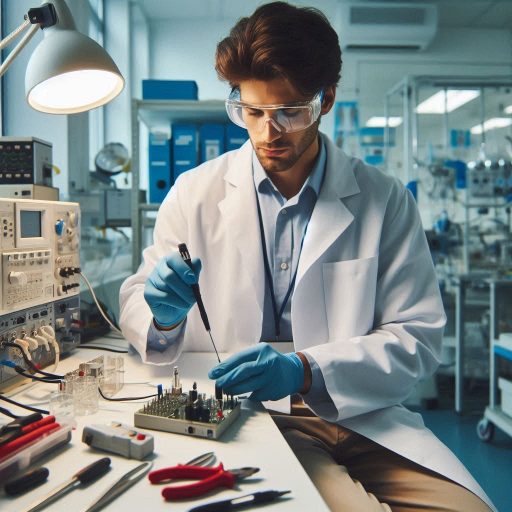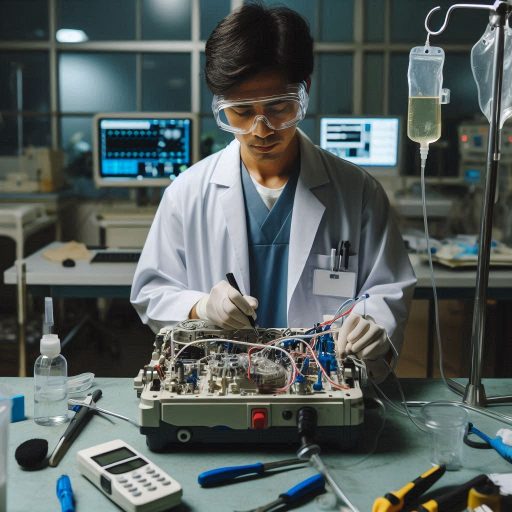Introduction
A biomedical technician is a professional who maintains and repairs medical equipment used in healthcare settings.
They ensure that devices like MRI machines, infusion pumps, and ventilators operate safely and effectively.
Their role is crucial in providing reliable and accurate medical equipment, which directly impacts patient care.
Biomedical technicians perform regular inspections, troubleshoot issues, and conduct repairs to prevent equipment malfunctions.
They work closely with medical staff to ensure that all devices meet safety and performance standards.
Their expertise helps minimize downtime and ensures that life-saving equipment is always ready for use.
Without biomedical technicians, hospitals and clinics would face increased risks of equipment failure, potentially jeopardizing patient safety and treatment outcomes.
Their role supports the overall functionality of healthcare facilities and contributes to efficient and effective patient care.
By maintaining high standards in medical equipment, biomedical technicians play a vital role in the healthcare system, ensuring that technology supports optimal patient outcomes.
Lack of standardized training
Different Educational Requirements in Different Institutions
Biomedical technicians often face varied educational requirements depending on the institution.
Some employers require an associate‘s degree, while others demand a bachelor‘s degree.
Certain healthcare facilities may prioritize specific certifications over formal education.
Differences in institutional requirements can create confusion for aspiring BMETs.
It is crucial to understand the specific educational qualifications needed for each position.
These variations affect job readiness and may require additional training or education for certain roles.
The biomedical technician field presents challenges related to varying educational requirements and a lack of universally recognized certifications.
These factors can impact job prospects and career advancement.
Understanding the specific qualifications needed for different institutions and staying updated with relevant certifications is crucial.
By addressing these challenges, BMETs can better navigate their career paths and enhance their opportunities for professional growth.
Lack of Universally Recognized Certifications
The biomedical technician field lacks universally recognized certifications, which complicates standardization across the industry.
Various certifying bodies offer different credentials, each with unique requirements and benefits.
For example, some organizations may prefer certifications from the Association for the Advancement of Medical Instrumentation (AAMI), while others may favor the International Certification Commission (ICC).
This lack of uniformity can make it challenging for BMETs to demonstrate their qualifications.
Employers may have varying preferences, creating uncertainty for technicians seeking to validate their skills and knowledge.
Impact on Job Prospects and Advancement
The variability in educational requirements and certifications impacts job prospects and career advancement for BMETs.
Technicians may find themselves at a disadvantage if their qualifications do not align with job requirements.
Employers might favor candidates with certifications recognized by their specific institution, limiting opportunities for those with different credentials.
Additionally, technicians may face barriers to career progression if their qualifications do not meet evolving industry standards.
To remain competitive, BMETs must stay informed about industry trends and continually update their skills and certifications.
Read: Networking Tips for Surveying and Mapping Professionals
Rapidly evolving technology
Constant Need for Training and Retraining
Biomedical technicians face a constant need for training and retraining.
The medical technology field evolves rapidly with new advancements.
Regular training ensures technicians stay current with the latest tools and techniques.
New devices and software require updated skills to operate effectively.
Training also helps BMETs understand new safety protocols and regulatory requirements.
Retraining helps technicians adapt to changes and maintain high standards of performance.
Continuous education is crucial to address the complexities of emerging technologies.
Staying updated prevents obsolescence and enhances job performance and career growth.
Challenges in Keeping Up with New Equipment
Keeping up with new equipment poses a significant challenge for BMETs.
Advanced medical devices often come with complex features and functionalities.
Learning how to operate and repair these devices requires time and effort.
Technicians must frequently update their knowledge to handle the latest technology effectively.
Manufacturers often release frequent updates and new models, adding to the challenge.
The rapid pace of innovation can make it difficult to stay proficient.
Effective training programs and resources are essential for overcoming these obstacles and ensuring technicians are prepared for new equipment.
Balancing Between Old and New Technologies in the Workplace
Balancing old and new technologies is another challenge for BMETs.
Many healthcare facilities use a mix of legacy and cutting-edge equipment.
Technicians must maintain and repair older devices while integrating and supporting new technologies.
This dual responsibility requires a diverse skill set and adaptability.
Technicians need to understand the intricacies of both types of equipment.
Managing this balance involves prioritizing tasks and ensuring that both old and new devices are functional.
Effective time management and resource allocation are critical to handling this challenge.
Balancing these responsibilities ensures that all equipment operates efficiently and safely.
Biomedical technicians face several challenges, including the constant need for training, keeping up with new equipment, and balancing old and new technologies.
Ongoing training and retraining are essential to stay current with advancements.
Keeping up with new equipment requires continuous learning and adaptation.
Managing both old and new technologies in the workplace demands a broad skill set and effective time management.
Addressing these challenges ensures technicians maintain high performance and contribute effectively to healthcare settings.
Read: Field vs. Office Work in Surveying and Mapping
The strain on time and resources
High Demand for Maintenance and Repairs
Biomedical Technicians often face a high demand for maintenance and repairs.
Medical facilities rely heavily on functional equipment to provide patient care.
When equipment fails, technicians must respond quickly to minimize downtime.
This constant pressure can lead to a heavy workload, as technicians address multiple issues simultaneously.
Keeping up with urgent repair requests requires strong problem-solving skills and the ability to prioritize tasks.
The high demand can be stressful but also highlights the critical role technicians play in healthcare settings.
Effective time management and organizational skills are essential to handle these demands efficiently.
Biomedical Technicians face several common challenges, including high demand for maintenance and repairs, limited staff and equipment resources, and pressure to meet deadlines.
The high demand necessitates excellent time management and problem-solving skills.
Limited resources can strain technicians‘ ability to perform their duties effectively.
Pressure to meet deadlines requires balancing speed with accuracy to ensure operational efficiency.
Addressing these challenges involves effective organizational strategies, clear communication, and seeking adequate support and resources.
By understanding and managing these common challenges, Biomedical Technicians can improve their effectiveness and contribute to the smooth operation of medical facilities.
Limited Staff and Equipment Resources
Limited staff and equipment resources pose significant challenges for Biomedical Technicians.
Many facilities operate with a small team responsible for a broad range of equipment.
This can lead to a high volume of tasks for each technician, stretching their capacity.
Additionally, insufficient equipment resources can make it difficult to perform repairs or maintenance efficiently.
Technicians may have to manage multiple types of equipment with limited tools and spare parts.
This constraint can impact the speed and quality of service provided.
Adequate support and resources are crucial for maintaining high standards in equipment management.
Pressure to Meet Deadlines
Meeting deadlines while keeping equipment running efficiently adds pressure to Biomedical Technicians‘ roles.
Healthcare environments demand timely maintenance and repairs to avoid disruptions in patient care.
Technicians often face tight schedules and urgent requests that require quick turnaround times.
The pressure to meet deadlines can be intense, especially when dealing with critical equipment.
Balancing speed with accuracy is crucial to ensure that repairs are done correctly and safely.
Effective communication with other healthcare staff and clear prioritization of tasks can help manage these pressures.
Technicians must also stay organized to handle multiple deadlines effectively.
Read: Importance of Accuracy in Surveying and Mapping

Regulatory compliance
Need to Stay Updated on Changing Regulations
Biomedical technicians face the constant challenge of staying updated on changing regulations.
Regulatory standards for medical equipment frequently evolve.
Technicians must track these updates to ensure compliance.
Keeping up with regulations involves reading industry publications and attending training sessions.
Regulatory changes can impact how equipment is maintained, tested, and repaired.
Failure to stay informed can lead to outdated practices and potential legal issues.
Regularly reviewing guidelines from organizations like the FDA or ISO is essential for maintaining compliance.
Staying updated helps BMETs provide high-quality care and avoid costly penalties.
Ensuring Equipment Meets Safety Standards
Ensuring that medical equipment meets safety standards is a critical responsibility for biomedical technicians.
Technicians must perform regular inspections and calibrations to verify compliance.
Equipment needs to meet specific performance criteria set by regulatory bodies.
Accurate documentation of maintenance activities is crucial for demonstrating adherence to safety standards.
Technicians must also be vigilant about potential safety hazards and take corrective actions promptly.
Failure to ensure equipment safety can lead to malfunction or inaccuracies, endangering patient health.
Regular training and certification help technicians keep their skills aligned with current safety requirements.
Consequences of Non-Compliance for Patients and the Facility
Non-compliance with safety standards and regulations can have severe consequences for both patients and healthcare facilities.
For patients, equipment failures can lead to misdiagnoses, ineffective treatments, or serious health risks.
Safety lapses increase the potential for adverse events and compromised patient outcomes.
For healthcare facilities, non-compliance can result in legal penalties, financial losses, and damage to reputation.
Facilities may face lawsuits or increased scrutiny from regulatory agencies.
Additionally, operational disruptions due to equipment issues can affect overall patient care quality.
Ensuring compliance helps protect patient safety and maintain the facility‘s credibility.
Read: Surveying and Mapping Technician: Job Satisfaction
Interdepartmental communication
Collaborating with Various Departments
Biomedical technicians often collaborate with multiple departments within healthcare facilities.
This collaboration is crucial for ensuring that medical equipment functions optimally.
Technicians work with clinical staff, IT departments, and facility management to address equipment needs and concerns.
Each department has unique priorities and perspectives that impact how biomedical technicians approach their tasks.
Clinical staff focus on patient care and may require quick responses for urgent equipment issues.
IT departments handle data management and network integration, which can affect how devices operate.
Facility management oversees the physical environment and infrastructure, which impacts equipment installation and maintenance.
Transform Your Career Today
Unlock a personalized career strategy that drives real results. Get tailored advice and a roadmap designed just for you.
Start NowUnderstanding Different Perspectives and Priorities
Understanding these diverse perspectives is key to effective collaboration.
Biomedical technicians must recognize that each department‘s priorities influence their interactions.
For example, clinical staff prioritize equipment reliability to ensure patient safety, while IT might focus on cybersecurity and system compatibility.
By acknowledging these differing priorities, technicians can better address the needs of each department.
This understanding helps in prioritizing tasks and managing expectations.
Technicians should actively listen to feedback and concerns from each department to tailor their approach effectively.
Importance of Effective Communication for Successful Outcomes
Effective communication is essential for successful outcomes in this collaborative environment.
Technicians must clearly convey technical information to non-technical staff and ensure that all parties understand equipment issues and solutions.
Clear communication helps prevent misunderstandings and ensures that everyone involved is aligned with the same goals.
Regular updates and status reports keep departments informed about equipment repairs, maintenance schedules, and any potential impacts on their operations.
This transparency fosters trust and improves cooperation between departments.
Moreover, open lines of communication allow technicians to address any concerns promptly and adapt to changing priorities.
By facilitating effective dialogue, technicians can coordinate better with other departments and contribute to a more efficient healthcare environment.
Therefore, collaborating with various departments requires understanding different perspectives and maintaining effective communication.
Biomedical technicians must navigate the unique priorities of clinical, IT, and facility management teams to ensure successful outcomes.
By fostering strong interdepartmental relationships and communicating clearly, technicians can enhance equipment reliability and support overall patient care.
Explore Further: Job Market Trends for Geological and Petroleum Technicians
High stress and pressure
Dealing with Life-Saving Equipment
Biomedical Technicians (BMETs) often work with life-saving equipment, such as ventilators and defibrillators.
Handling these devices requires high precision and expertise.
Ensuring their proper functionality is crucial because any malfunction can have severe consequences for patient care.
BMETs must perform regular maintenance and rigorous testing to keep these devices operational.
They must also stay updated with the latest technologies and advancements.
This ensures they can address any issues that arise swiftly and effectively.
The responsibility of maintaining life-saving equipment can be stressful.
BMETs must remain vigilant and proactive in their tasks to prevent equipment failures.
Continuous training and adherence to safety protocols help mitigate risks and ensure the equipment functions correctly.
Working in Emergency Situations
Working in emergency situations poses unique challenges for BMETs.
They often must respond quickly to urgent repair requests and troubleshoot equipment issues under pressure.
This fast-paced environment demands quick thinking and immediate action.
BMETs might need to work long hours or handle multiple critical tasks simultaneously during emergencies.
This can be physically and mentally taxing.
Staying calm and focused is essential to manage these high-stress scenarios effectively.
Preparation and practice play key roles in handling emergencies.
Regular drills and simulations can help BMETs practice their responses to critical situations.
This preparedness enhances their ability to manage emergencies and ensure patient safety.
Coping with the Responsibility and Impact on Patient Care
The responsibility of ensuring equipment reliability directly impacts patient care.
BMETs must cope with the pressure of knowing that their work affects patients‘ lives.
This responsibility can be overwhelming at times, as the stakes are incredibly high.
Effective stress management techniques are essential for coping with this pressure.
BMETs should adopt strategies such as time management, relaxation techniques, and seeking support from colleagues.
Balancing professional and personal life helps maintain overall well-being and job performance.
BMETs should also focus on continuous professional development.
Staying updated with the latest industry standards and technologies helps them perform their duties effectively.
Ongoing education and training ensure they are equipped to handle any challenges that arise.
Burnout and turnover
Long Hours and Demanding Workload
Biomedical technicians often face long hours and demanding workloads.
Many technicians work beyond standard business hours to ensure equipment functionality.
They may be on call for emergencies, leading to irregular schedules.
The workload can be physically and mentally taxing, with technicians frequently dealing with high-stress situations.
Managing multiple tasks simultaneously can lead to burnout if not properly addressed.
Long hours and heavy demands often result in fatigue, impacting overall job performance and well-being.
Lack of Recognition and Support
A significant challenge for biomedical technicians is the lack of recognition and support.
Their work, while critical, often goes unnoticed compared to other healthcare roles.
Technicians may not receive the acknowledgment they deserve for maintaining complex equipment essential for patient care.
Additionally, support from management can be insufficient, leaving technicians to handle issues without adequate resources or assistance.
This lack of recognition can lead to feelings of undervaluation and disengagement from their work.
Impact on Job Satisfaction and Retention Rates
The combination of long hours, demanding workloads, and insufficient recognition affects job satisfaction and retention rates.
Technicians who experience high stress and burnout are less likely to remain in their positions long-term.
Low job satisfaction often leads to higher turnover rates, which impacts team stability and continuity of care.
Organizations with high turnover may struggle to maintain quality standards and face increased training costs.
Addressing these challenges by offering better support, recognition, and manageable workloads can improve job satisfaction and reduce retention issues.
Biomedical technicians face challenges including long hours, demanding workloads, and a lack of recognition and support.
These factors impact job satisfaction and retention rates.
By acknowledging these issues and implementing supportive measures, organizations can improve working conditions for BMETs.
Enhancing recognition, offering adequate support, and managing workloads effectively are key to maintaining a satisfied and committed workforce.
Addressing these challenges not only benefits technicians but also enhances overall operational efficiency and patient care.
Conclusion
Biomedical technicians face several challenges in their roles.
One major issue is keeping up with rapidly evolving technology.
Technicians must regularly update their skills to handle new equipment.
Another challenge involves working under pressure during critical equipment failures.
Maintaining and troubleshooting complex medical devices requires high-level expertise.
Additionally, technicians often work in environments with varying levels of support and resources.
These challenges can impact the quality of patient care.
Addressing these issues is crucial for ensuring that medical equipment functions optimally.
Improved training and access to resources can help technicians overcome these difficulties.
Hospitals and facilities should invest in ongoing education and support for their staff.
Providing up-to-date tools and systems can also alleviate some of these challenges.
By addressing these obstacles, healthcare facilities enhance patient safety and care.
Encourage open communication between technicians and management to identify and resolve issues.
Advocate for better support and resources to improve working conditions.
Investing in technicians‘ professional development directly benefits patient outcomes and overall healthcare quality.
[E-Books for Sale]
The Big Book of 500 High-Paying Jobs in America: Unlock Your Earning Potential
$19.99 • 500 High-Paying Jobs • 330 pages
Explore 500 high-paying jobs in America and learn how to boost your career, earn more, and achieve success!
See All 500 High-Paying Jobs of this E-Book
1001 Professions Without a Degree: High-Paying American Jobs You Can Start Now
$19.99 • 1001 Professions Without a Degree • 174 pages
Discover 1001 high-paying jobs without a degree! Unlock career tips, skills, and success strategies for just $19.99!




